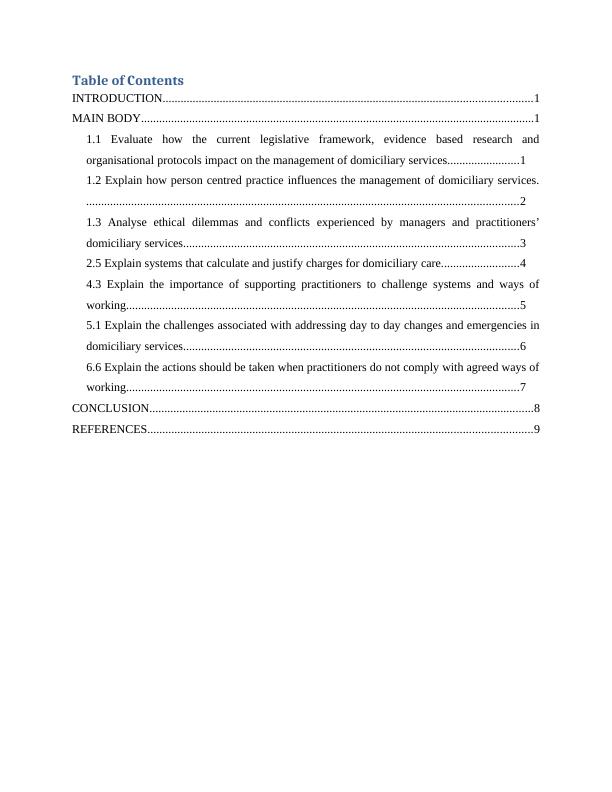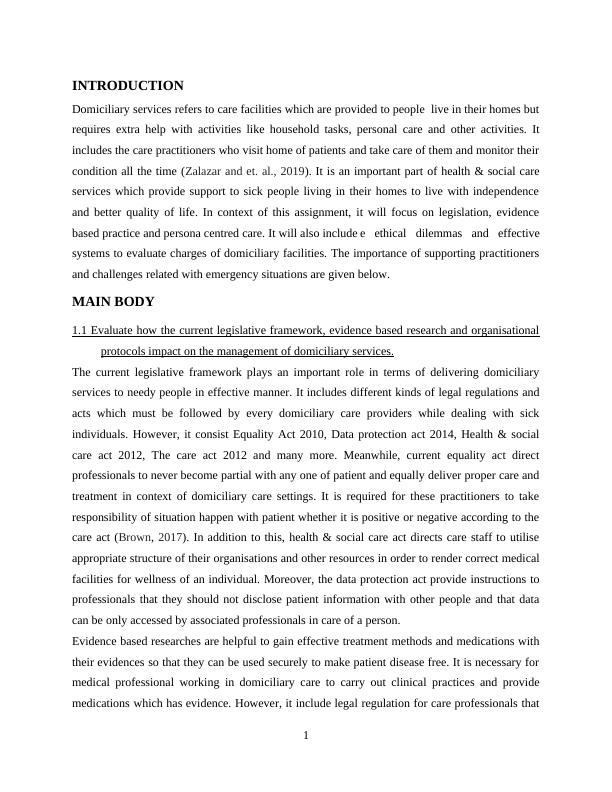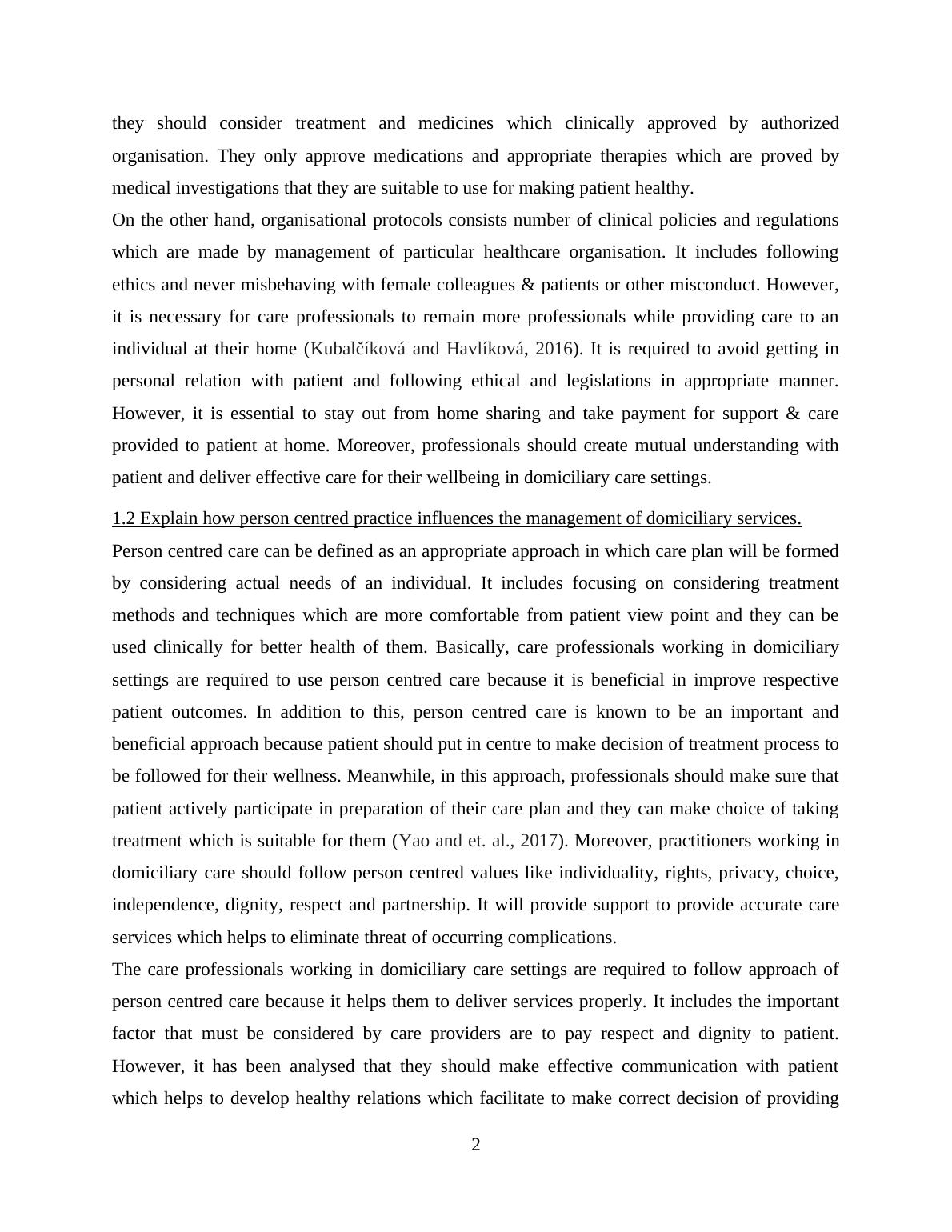Management of Domiciliary Services
Added on 2023-01-12
11 Pages3605 Words38 Views
Manage Domiciliary Services

Table of Contents
INTRODUCTION...........................................................................................................................1
MAIN BODY...................................................................................................................................1
1.1 Evaluate how the current legislative framework, evidence based research and
organisational protocols impact on the management of domiciliary services........................1
1.2 Explain how person centred practice influences the management of domiciliary services.
................................................................................................................................................2
1.3 Analyse ethical dilemmas and conflicts experienced by managers and practitioners’
domiciliary services................................................................................................................3
2.5 Explain systems that calculate and justify charges for domiciliary care..........................4
4.3 Explain the importance of supporting practitioners to challenge systems and ways of
working...................................................................................................................................5
5.1 Explain the challenges associated with addressing day to day changes and emergencies in
domiciliary services................................................................................................................6
6.6 Explain the actions should be taken when practitioners do not comply with agreed ways of
working...................................................................................................................................7
CONCLUSION................................................................................................................................8
REFERENCES................................................................................................................................9
INTRODUCTION...........................................................................................................................1
MAIN BODY...................................................................................................................................1
1.1 Evaluate how the current legislative framework, evidence based research and
organisational protocols impact on the management of domiciliary services........................1
1.2 Explain how person centred practice influences the management of domiciliary services.
................................................................................................................................................2
1.3 Analyse ethical dilemmas and conflicts experienced by managers and practitioners’
domiciliary services................................................................................................................3
2.5 Explain systems that calculate and justify charges for domiciliary care..........................4
4.3 Explain the importance of supporting practitioners to challenge systems and ways of
working...................................................................................................................................5
5.1 Explain the challenges associated with addressing day to day changes and emergencies in
domiciliary services................................................................................................................6
6.6 Explain the actions should be taken when practitioners do not comply with agreed ways of
working...................................................................................................................................7
CONCLUSION................................................................................................................................8
REFERENCES................................................................................................................................9

INTRODUCTION
Domiciliary services refers to care facilities which are provided to people live in their homes but
requires extra help with activities like household tasks, personal care and other activities. It
includes the care practitioners who visit home of patients and take care of them and monitor their
condition all the time (Zalazar and et. al., 2019). It is an important part of health & social care
services which provide support to sick people living in their homes to live with independence
and better quality of life. In context of this assignment, it will focus on legislation, evidence
based practice and persona centred care. It will also include e ethical dilemmas and effective
systems to evaluate charges of domiciliary facilities. The importance of supporting practitioners
and challenges related with emergency situations are given below.
MAIN BODY
1.1 Evaluate how the current legislative framework, evidence based research and organisational
protocols impact on the management of domiciliary services.
The current legislative framework plays an important role in terms of delivering domiciliary
services to needy people in effective manner. It includes different kinds of legal regulations and
acts which must be followed by every domiciliary care providers while dealing with sick
individuals. However, it consist Equality Act 2010, Data protection act 2014, Health & social
care act 2012, The care act 2012 and many more. Meanwhile, current equality act direct
professionals to never become partial with any one of patient and equally deliver proper care and
treatment in context of domiciliary care settings. It is required for these practitioners to take
responsibility of situation happen with patient whether it is positive or negative according to the
care act (Brown, 2017). In addition to this, health & social care act directs care staff to utilise
appropriate structure of their organisations and other resources in order to render correct medical
facilities for wellness of an individual. Moreover, the data protection act provide instructions to
professionals that they should not disclose patient information with other people and that data
can be only accessed by associated professionals in care of a person.
Evidence based researches are helpful to gain effective treatment methods and medications with
their evidences so that they can be used securely to make patient disease free. It is necessary for
medical professional working in domiciliary care to carry out clinical practices and provide
medications which has evidence. However, it include legal regulation for care professionals that
1
Domiciliary services refers to care facilities which are provided to people live in their homes but
requires extra help with activities like household tasks, personal care and other activities. It
includes the care practitioners who visit home of patients and take care of them and monitor their
condition all the time (Zalazar and et. al., 2019). It is an important part of health & social care
services which provide support to sick people living in their homes to live with independence
and better quality of life. In context of this assignment, it will focus on legislation, evidence
based practice and persona centred care. It will also include e ethical dilemmas and effective
systems to evaluate charges of domiciliary facilities. The importance of supporting practitioners
and challenges related with emergency situations are given below.
MAIN BODY
1.1 Evaluate how the current legislative framework, evidence based research and organisational
protocols impact on the management of domiciliary services.
The current legislative framework plays an important role in terms of delivering domiciliary
services to needy people in effective manner. It includes different kinds of legal regulations and
acts which must be followed by every domiciliary care providers while dealing with sick
individuals. However, it consist Equality Act 2010, Data protection act 2014, Health & social
care act 2012, The care act 2012 and many more. Meanwhile, current equality act direct
professionals to never become partial with any one of patient and equally deliver proper care and
treatment in context of domiciliary care settings. It is required for these practitioners to take
responsibility of situation happen with patient whether it is positive or negative according to the
care act (Brown, 2017). In addition to this, health & social care act directs care staff to utilise
appropriate structure of their organisations and other resources in order to render correct medical
facilities for wellness of an individual. Moreover, the data protection act provide instructions to
professionals that they should not disclose patient information with other people and that data
can be only accessed by associated professionals in care of a person.
Evidence based researches are helpful to gain effective treatment methods and medications with
their evidences so that they can be used securely to make patient disease free. It is necessary for
medical professional working in domiciliary care to carry out clinical practices and provide
medications which has evidence. However, it include legal regulation for care professionals that
1

they should consider treatment and medicines which clinically approved by authorized
organisation. They only approve medications and appropriate therapies which are proved by
medical investigations that they are suitable to use for making patient healthy.
On the other hand, organisational protocols consists number of clinical policies and regulations
which are made by management of particular healthcare organisation. It includes following
ethics and never misbehaving with female colleagues & patients or other misconduct. However,
it is necessary for care professionals to remain more professionals while providing care to an
individual at their home (Kubalčíková and Havlíková, 2016). It is required to avoid getting in
personal relation with patient and following ethical and legislations in appropriate manner.
However, it is essential to stay out from home sharing and take payment for support & care
provided to patient at home. Moreover, professionals should create mutual understanding with
patient and deliver effective care for their wellbeing in domiciliary care settings.
1.2 Explain how person centred practice influences the management of domiciliary services.
Person centred care can be defined as an appropriate approach in which care plan will be formed
by considering actual needs of an individual. It includes focusing on considering treatment
methods and techniques which are more comfortable from patient view point and they can be
used clinically for better health of them. Basically, care professionals working in domiciliary
settings are required to use person centred care because it is beneficial in improve respective
patient outcomes. In addition to this, person centred care is known to be an important and
beneficial approach because patient should put in centre to make decision of treatment process to
be followed for their wellness. Meanwhile, in this approach, professionals should make sure that
patient actively participate in preparation of their care plan and they can make choice of taking
treatment which is suitable for them (Yao and et. al., 2017). Moreover, practitioners working in
domiciliary care should follow person centred values like individuality, rights, privacy, choice,
independence, dignity, respect and partnership. It will provide support to provide accurate care
services which helps to eliminate threat of occurring complications.
The care professionals working in domiciliary care settings are required to follow approach of
person centred care because it helps them to deliver services properly. It includes the important
factor that must be considered by care providers are to pay respect and dignity to patient.
However, it has been analysed that they should make effective communication with patient
which helps to develop healthy relations which facilitate to make correct decision of providing
2
organisation. They only approve medications and appropriate therapies which are proved by
medical investigations that they are suitable to use for making patient healthy.
On the other hand, organisational protocols consists number of clinical policies and regulations
which are made by management of particular healthcare organisation. It includes following
ethics and never misbehaving with female colleagues & patients or other misconduct. However,
it is necessary for care professionals to remain more professionals while providing care to an
individual at their home (Kubalčíková and Havlíková, 2016). It is required to avoid getting in
personal relation with patient and following ethical and legislations in appropriate manner.
However, it is essential to stay out from home sharing and take payment for support & care
provided to patient at home. Moreover, professionals should create mutual understanding with
patient and deliver effective care for their wellbeing in domiciliary care settings.
1.2 Explain how person centred practice influences the management of domiciliary services.
Person centred care can be defined as an appropriate approach in which care plan will be formed
by considering actual needs of an individual. It includes focusing on considering treatment
methods and techniques which are more comfortable from patient view point and they can be
used clinically for better health of them. Basically, care professionals working in domiciliary
settings are required to use person centred care because it is beneficial in improve respective
patient outcomes. In addition to this, person centred care is known to be an important and
beneficial approach because patient should put in centre to make decision of treatment process to
be followed for their wellness. Meanwhile, in this approach, professionals should make sure that
patient actively participate in preparation of their care plan and they can make choice of taking
treatment which is suitable for them (Yao and et. al., 2017). Moreover, practitioners working in
domiciliary care should follow person centred values like individuality, rights, privacy, choice,
independence, dignity, respect and partnership. It will provide support to provide accurate care
services which helps to eliminate threat of occurring complications.
The care professionals working in domiciliary care settings are required to follow approach of
person centred care because it helps them to deliver services properly. It includes the important
factor that must be considered by care providers are to pay respect and dignity to patient.
However, it has been analysed that they should make effective communication with patient
which helps to develop healthy relations which facilitate to make correct decision of providing
2

End of preview
Want to access all the pages? Upload your documents or become a member.
Related Documents
Domiciliary Care in Improving Safety and Qualitylg...
|7
|1476
|159
Unit 19 Reflective Approaches in Implementing Person Centred Practicelg...
|17
|4777
|86
Importance of Reflective Practice in Improving Performancelg...
|15
|3512
|67
The Health Care Professionallg...
|16
|816
|63
Residential Care Serviceslg...
|11
|1567
|71
Person Centered Practice in Healthcarelg...
|10
|3114
|51
